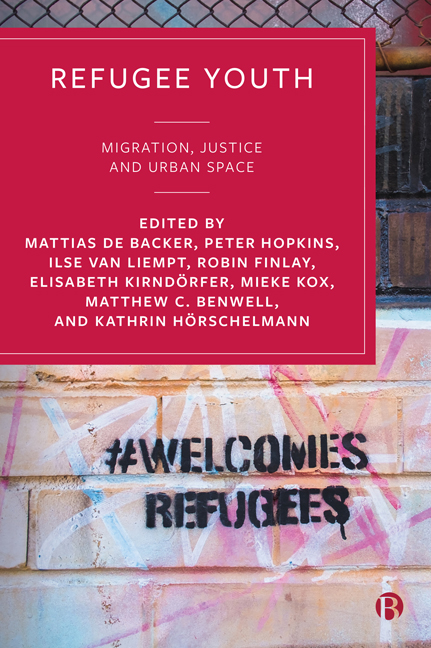Book contents
- Frontmatter
- Contents
- List of Figures and Tables
- Notes on Contributors
- Acknowledgements
- 1 Introducing Refugee Youth: Migration, Justice and Urban Space
- 2 Storying Belonging, Enacting Citizenship? (Dis)articulations of Belonging in a Community Theatre Project with Young Refugees and Asylum Seekers in Leipzig, Germany
- 3 Jackets and Jewellery: Racialised Dispossession and Struggles over Public Space in Denmark
- 4 Venezuelan Refugee Youth and Brazilian Schooling: The Individual between Languages and Spaces
- 5 The Inclusionary Potential and Spatial Boundaries of (Semi-)Public Space: Refugee Youth’s Everyday Experiences in the Urban Fabric of Amsterdam
- 6 Navigating ‘Purdah’ Culture in Urban Space: The Restricted Lives of Young Married Rohingya Refugees in Malaysia
- 7 Inclusive Urban Planning and Public Space for Refugee Youth in Pursuit of a Just City in Amman, Jordan
- 8 Sense of Belonging among Tibetan Refugees in India: A Case Study of the Bylakuppe Settlement in Karnataka, India
- 9 Negotiating Identity in Urban Space: Everyday Geographies of Syrian Students in Istanbul
- 10 ‘You’re Judged a Lot’: Australian Sudanese and South Sudanese Youths’ Perspectives on Their Experiences in Public Spaces
- 11 Hair Salons as ‘Private-Public Spaces’: Exploring the Experiences of Young Migrant Women in an Urban Township in South Africa
- 12 Emotion and Spatial Belonging: Exploring Young Migrant Men’s Emotional Geographies in Cork, Ireland
- 13 Homemaking through Music in Urban Africa: Creating Opportunities as a Refugee and a Migrant in Kinshasa and Dar es Salaam
- 14 Planetary Listening
- 15 Refugee Youth: Politics, Publicness and Visibility
- Index
4 - Venezuelan Refugee Youth and Brazilian Schooling: The Individual between Languages and Spaces
Published online by Cambridge University Press: 18 January 2024
- Frontmatter
- Contents
- List of Figures and Tables
- Notes on Contributors
- Acknowledgements
- 1 Introducing Refugee Youth: Migration, Justice and Urban Space
- 2 Storying Belonging, Enacting Citizenship? (Dis)articulations of Belonging in a Community Theatre Project with Young Refugees and Asylum Seekers in Leipzig, Germany
- 3 Jackets and Jewellery: Racialised Dispossession and Struggles over Public Space in Denmark
- 4 Venezuelan Refugee Youth and Brazilian Schooling: The Individual between Languages and Spaces
- 5 The Inclusionary Potential and Spatial Boundaries of (Semi-)Public Space: Refugee Youth’s Everyday Experiences in the Urban Fabric of Amsterdam
- 6 Navigating ‘Purdah’ Culture in Urban Space: The Restricted Lives of Young Married Rohingya Refugees in Malaysia
- 7 Inclusive Urban Planning and Public Space for Refugee Youth in Pursuit of a Just City in Amman, Jordan
- 8 Sense of Belonging among Tibetan Refugees in India: A Case Study of the Bylakuppe Settlement in Karnataka, India
- 9 Negotiating Identity in Urban Space: Everyday Geographies of Syrian Students in Istanbul
- 10 ‘You’re Judged a Lot’: Australian Sudanese and South Sudanese Youths’ Perspectives on Their Experiences in Public Spaces
- 11 Hair Salons as ‘Private-Public Spaces’: Exploring the Experiences of Young Migrant Women in an Urban Township in South Africa
- 12 Emotion and Spatial Belonging: Exploring Young Migrant Men’s Emotional Geographies in Cork, Ireland
- 13 Homemaking through Music in Urban Africa: Creating Opportunities as a Refugee and a Migrant in Kinshasa and Dar es Salaam
- 14 Planetary Listening
- 15 Refugee Youth: Politics, Publicness and Visibility
- Index
Summary
Introduction
In 2018, Brazil began to experience what was popularly and discursively framed as a ‘migration crisis’, due to its geographical situation as a border country with Venezuela, from where a significant number of immigrants came to the country (UNHCR, 2020). Although immigration was an important part of the formation of Brazil itself, accentuated at specific periods in its history, immigration from Venezuela began to attract national attention when thousands of Venezuelans started crossing the border, after a long journey in search of food and healthcare (UNHCR, 2020). According to data from the Brazilian Federal Police, in March 2018, almost a thousand Venezuelans entered Brazil every day, through the city of Pacaraima, in the state of Roraima. This phenomenon subsequently became known as the Venezuelan migratory crisis in Brazil, which led to a wave of xenophobia that marked the arrival and reception of Venezuelans, not only in Roraima but throughout the country.
The situation of Venezuelan refugees and migrants is relevant for us, especially the arrival of groups in the state of Pernambuco (Northeastern Brazil), through the programme for the nationalisation of refugees, in particular in the city of Igarassu, metropolitan region of Recife (capital of the state of Pernambuco), which in 2019 had more than 120 migrant families under the coordination of the youth-focused non-governmental organisation (NGO), Aldeias Infantis SOS. We understand that the designations ‘refugees’ and ‘migrants’ determine different meanings. The group we are working with is made up of refugees and migrants with temporary residence. For standardisation purposes, we will call them ‘migrants’.
According to information from the United Nations Children's Fund (UNICEF), 10,000 Venezuelan children entered Brazil between 2018 and 2019. The children who arrived needed to be taken to public schools in the country, which had different implications for those schools. By law, every refugee and migrant is entitled to a place in public education. In order to enforce the law, the state, through the public education system, must guarantee each school the means of communication to integrate these new students into different school practices. Not only students, but their parents and the entire school community should have the possibility of integration, which could be mediated/promoted by the school.
- Type
- Chapter
- Information
- Refugee YouthMigration, Justice and Urban Space, pp. 48 - 64Publisher: Bristol University PressPrint publication year: 2023



